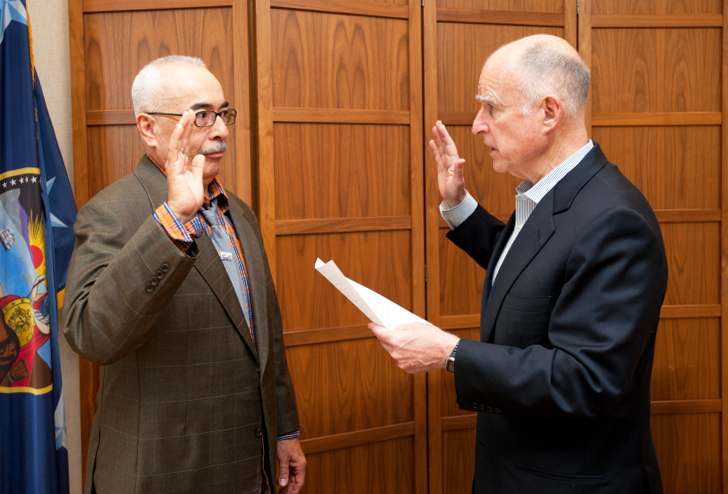UCLA alumnus and UC Riverside Professor Juan Felipe Herrera becomes California poet laureate

Courtesy of OFFICE OF GOV. JERRY BROWN
UCLA alumnus Juan Felipe Herrera was sworn in as the California poet laureate by Gov. Jerry Brown last week.
By Daily Bruin Staff
April 5, 2012 1:17 a.m.
Juan Felipe Herrera stood alone, nervously reciting his poetry in the middle of the designated free speech area in Kerckhoff Plaza.
It was 1968, and the civil rights movement was at its height. And Herrera had found a stage to express himself. That modest stage launched a long career in poetry, and last week, Herrera, a UCLA alumnus and a current UC Riverside professor, was sworn in as California poet laureate by Gov. Jerry Brown.
Herrera is the first Latino to be appointed to the position in California. The son of migrant workers and now a prominent advocate for immigrant and Latino rights, Herrera began his work in poetry as well as his involvement with the Chicano civil rights movement at UCLA.
“(Herrera) is a very powerful symbol of what poetry and language can do in terms of finding a way to make sense for yourself and to communicate with others,” said his publisher and longtime friend Elaine Katzenberger, referencing his modest background.
The poet laureate’s responsibilities as the state’s official poet include six public performances throughout the state. It also includes doing a project that engages the public in usually underserved areas, said Mary Beth Barber, information officer at California Arts Council.
While Herrera had been interested in poetry since middle school, he did not have the avenue with which to share his poetry until he went to college. Kerckhoff Plaza was the only designated free speech area at UCLA in the late 1960s and early 1970s, but he did not question the policy. Having free speech was enough, Herrera said.
“You can imagine the electricity in the air within the faculty, the students, the times,” he said. “The civil rights movement (was) coursing through our blood. … I was in the middle of that creative and political social tsunami.
“(My poetry is) about stories that I felt had not been told or that were distorted from my point of view,” he said.
These included the view of farm workers or the Latino community. One poem, “187 Reasons Mexicanos Can’t Cross the Border,” is an example of how Herrera channels social activism into his work, Katzenberger said.
“Poetry has the power to move people,” said Chon Noriega, director of the UCLA Chicano Studies Research Center, who is familiar with Herrera’s work. The Chicano movement was largely fueled by the arts and especially by poetry, and Herrera emerged during that period, he said.
Throughout his career, Herrera worked to share the art of poetry with those who do not have regular access to poetry or creative writing. He has done reading and writing workshops in underserved schools throughout California, in addition to launching a “Verbal Coliseum” ““ a place for open mic nights and poetic creativity at UC Riverside.
Because of his already active career in poetry, Herrera said the position of poet laureate is more of a continuation of what he has been doing since 1970.
Herrera aims to bring higher accessibility to different communities with his new project that he is launching next week, called “Project Primavera California,” which means “Project Spring California.” The project will call on poets, librarians and artists of all genres to come together and celebrate poetry through their own mediums.
For example, a musician can direct a piece based on a poem written by someone else, Herrera said. These projects will take place in classrooms, street festivals and other locations across the state.
Another strand of the project is called “Libros y Familias,” or “Books and Families.” The project would bring local children’s book authors to a school to present their books bilingually to the students, and the same book in the evening to the parents.
This would give access to books to non-English speaking students, as well as connect children and their parents with literature, Herrera said.
“I think the poet laureate position ideally … helps people connect with poetry and what it can do,” Katzenberger said. “That is what (Herrera) has spent a lifetime doing.”
Through his projects, Herrera said he hopes he can continue to cross cultural, social and artistic boundaries.
“I’ve been able to stretch out my hand, and now we can all hold each other’s hands and have a conversation,” he said. “Let’s … break down crusty borders and start growing.”

